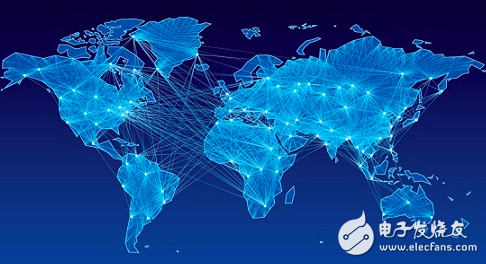Blockchain is a distributed ledger technology (DLT) that makes it possible to conduct open and trusted exchanges over the Internet without the need for a central server or a separate trusted authority. The blockchain promotes transparent, verifiable and secure digital asset transactions, proving rights and ownership.
Based on cryptographically driven consensus building, the blockchain uses decentralized databases and peer-to-peer computing nodes to provide the same incentives for transactions through secure, trusted layers. In 2008, the blockchain was first used to introduce Bitcoin, an electronic payment network, and is now becoming the underlying technology to support the new “value Internet†paradigm.

Each numeric ledger block contains a timestamp and a link to the previous block. The value unit is transferred from owner A to owner B by the network node tracking the account balance. Ownership is verified by a link to all previous transactions. Each node logs all transactions. Authentication is achieved through consensus, and trust is generated by transparent and auditable information flows.
By storing information in multiple password-authenticated ledger copies in the network, blockchain eliminates single points of failure, hacking or any single entity control, and it is difficult to compromise the entire global network because of historical transactions. The data is embedded in multiple nodes.
Mobile operator opportunities
Blockchain technology provides mobile operators with an excellent opportunity to support the transformation of business models through a new network layer that can revolutionize the way data integrity is verified and transfer and track values ​​and entitlements through infrastructure user.
It is possible for Tier 1 mobile operators to create new blockchain partnerships with the General Ledger to improve interoperability across the industry. This will control costs, provide broad coverage, and effectively redefine the intermediary role of many industries.
Some blockchain projects are based on concepts consistent with the goals of a particular 5G architecture, from distributed systems and databases to low-latency, high-performance distributed computing nodes. Adding blockchains to new and old distributed systems can make operations safer, autonomous, flexible, and profitable. Network protocols and infrastructure will need to address the network timing requirements of blockchain-based applications, scale to support millions of nodes, and ensure transactions reach all participating peers. Every transaction on the mobile network must be digitally signed to ensure authenticity. By enabling mobile network elements to be dynamically exchanged, blockchains can encourage the growth of mobile networks by providing access to other network resources.
Mobile operators are poised to provide content providers with a “blockchain-as-a-service†ecosystem that can store their products across the entire mobile network and use blockchain infrastructure for access control and monetization. Smart contracts protect copyright, automate online sales, and eliminate the risk of hacking and content redistribution. In addition, blockchain provides variable, demand-based content pricing through automatic discovery.
5G service support
In place of current and aged cellular systems, the blockchain framework will assist a new generation of distributed wireless networks by allowing seamless provisioning between heterogeneous access nodes and devices. Through the blockchain, access nodes, terms and protocols between the network and the user can be negotiated instantly as a digital smart contract. Any device can negotiate the best service, and the operator can dynamically adjust the code in the smart contract of any network node. This allows for seamless service and new billing and business models between networks, providers and 5G access nodes. Mobile services that support blockchain can be adapted to location and user needs and adjusted for supply and demand.
Blockchain can help deploy 5G wireless access technologies by providing seamless access across multiple networks for a variety of devices and IoT endpoints. Improved internal processes such as Operational Support Systems (OSS) and Business Support Systems (BSS) will reduce costs and increase competitiveness.
Key to adoption
Mobile networks are critical to the success of blockchains. The increased carrier will power the blockchain integration by addressing new use cases to enhance the user's digital experience.
Moving the blockchain beyond the proof of concept phase due to serious technical barriers will require key industry players to support multiple types of use cases on public networks, with private entities and government regulators representing the legal system Cooperation with different states, provinces and countries.
Service providers can provide a low-cost, low-risk blockchain service platform for a variety of developers. The core strategy must be to install new infrastructure components to support the deployment of the blockchain framework, which is then supported by the network and distributed cloud computing platforms. Mobile operators will own and support back-end blockchains that application developers can use to create new trust and transaction applications.
Many large industry players are vying for control in the IoT space, investing in blockchain technology, focusing on security, encryption and smart contract innovation. To compete, mobile operators need to provide a blockchain framework that leverages the Internet of Things, big data, content delivery and digital identity.
Mobile operators must go beyond simply extending the connectivity of existing telecommunications infrastructure. They need to create value, validate digital information and execute smart contracts that are supported by market analysis, predictive maintenance and large-scale automation of management applications and services. Intelligent IoT contracts will allow remote automation of IoT-based systems and facilitate autonomous exchange of data and value between devices and virtual or physical objects on the network.
Modern Physics Experiment Series
Modern physics experiment related equipment for efficient specialized physics laboratory
Modern Physics Experiment Instruments,Optical Instruments,Acousto-Optic Modulator Experimental Device,Optical Spectroscopy Experiment Determinator
Yuheng Optics Co., Ltd.(Changchun) , https://www.yhenoptics.com